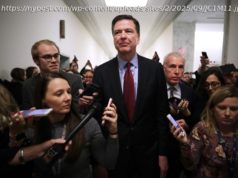US command in South Korea and Seoul’s presidential office say they were not told of any change in planned war games
US President Donald Trump’s abrupt announcement in Singapore on Tuesday that he will suspend US military drills in South Korea appeared to catch both the Pentagon and the Seoul government flat-footed, and it contradicted a pillar of US Defence Secretary James Mattis’s campaign to make US troops more combat-ready.
During a news conference following his summit with North Korean leader Kim Jong-un, Trump pushed his unconventional approach even further by calling annual US-South Korean military exercises “provocative”. He also said he’d like to remove all 28,500 US troops stationed in the South, though he made clear this was an option for future consideration, not a part of current negotiations.
The US, which has kept combat troops on the Korean peninsula since a 1950 surprise attack by the North started the Korean war, has drilled them for years in a variety of exercises intended to sharpen skills and test their ability to operate
effectively with their South Korean partners.
The next scheduled major exercise, known as Ulchi Freedom Guardian and involving tens of thousands of troops, would normally be held in August.
“We will be stopping the war games, which will save us a tremendous amount of money, unless and until we see the future negotiation is not going along like it should,” Trump said in Singapore. “But we’ll be saving a tremendous amount of money. Plus, I think it’s very provocative.”
In the wake of Trump’s unexpected, almost offhand comments to reporters, the Pentagon said it was consulting the White House and others but was silent on whether Ulchi Freedom Guardian will proceed.
Mattis’s chief spokeswoman, Dana W. White, told reporters that the secretary was “in full alignment” with Trump and had been consulted in advance on all aspects of the Singapore talks.
“There were no surprises,” she said.
If Mattis was aware that Trump was going to announce a suspension of military exercises, he apparently did not share that information with the South Koreans or with the military organisation most directly affected: US Forces Korea.
That US command said it had “received no updated guidance on the execution or cessation of training exercises”.
The South Korean government also appeared caught off guard. Seoul’s presidential office said it was trying to parse Trump’s comments. The South Korean military seemed similarly surprised.
“At this current point, there is a need to discern the exact meaning and intent of President Trump’s comments,” Seoul’s defence Ministry said, adding that there had been no discussions yet with Washington on modifying the drills set for August.
Trump’s remarks contradicted decades of assertions by US administrations that military exercises in South Korea are defensive and essential to ensuring that allied forces are ready at a moment’s notice to fight the North. A favoured US slogan in South Korea is “ready to fight tonight”.
Mattis often says his No. 1 priority as defence secretary is to improve what he calls the “lethality” of the military, which includes making troops better equipped, trained and prepared for a full range of combat. In his view, preparedness equates to more effective deterrence – persuading potential adversaries they cannot win and thus should not attack.
Trump’s statement was portrayed by critics as an unreciprocated concession.
“Stopping the joint exercises has been a long-term goal for North Korea and China,” two Asia analysts, Victor Cha and Sue Mi Terry, wrote in a summit assessment for the Centre for Strategic and International Studies. “Trump delivered it while getting nothing in return beyond the same generalities that North Korea has been offering since the early 1990s.”
Even some Republicans in Congress seemed uneasy. Representative Ed Royce of California, chairman of the House Foreign Affairs Committee, applauded Trump for pursuing peace through diplomacy, but also said Kim had “gained much” on Tuesday, “including an apparent promise” from Trump to suspend military drills.
Trump also seemed annoyed that US bomber aircraft make long flights from the Pacific island of Guam to the Korean peninsula as part of its exercise routine.
“Six and a half hours — that’s a long time for these big massive planes to be flying to South Korea to practice and then drop bombs all over the place, and then go back to Guam,” Trump said. “I know a lot about aeroplanes; it’s very expensive.”
Trump’s announcement that the US would stop military exercises and his suggestion that he wants to pull US troops out at some point are “things that Trump is putting on the table as concessions, all in exchange for some vague promises by the North Koreans,” said Paul Haenle, a former China director at the White House National Security Council in the George W. Bush and Barack Obama administrations.
The Republican chairman of the US Senate Foreign Relations Committee, Bob Corker, said that it was difficult to assess what had happened at the summit.
Speaking about the military exercises, Corker told Reuters: “I don’t know if that’s an agreement or an ad hoc statement that was made. It wasn’t in the agreement and sometimes things are said and walked back after talking to people at the Pentagon and other places.”
North Korea regularly calls the military exercises preparations for a northward invasion, and many of the scariest stand-offs in recent years on the Korean peninsula have happened when the drills were being staged.
Outside analysts believe the North objects to the drills because it must spend precious resources on its own war games and troop movements. North Korea also insists that the US troop presence in the South, as well as its nuclear “umbrella” over allies Seoul and Tokyo, are part of America’s “hostile” policy toward the North.
Moon Seong-mook, a former South Korean military official, said that Trump’s comments on the drills confirmed what many in South Korea had feared all along — that North Korea would try to drive a wedge between Washington and Seoul and gain substantial concessions from an unconventional US president who thinks much less of the traditional alliance than his predecessors.
Home
United States
USA — mix Trump’s vow to end military drills with South Korea contradicts Pentagon stance...






